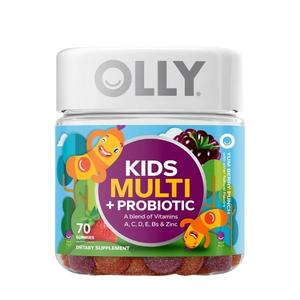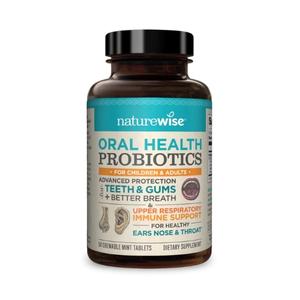 Expert's opinion
Expert's opinion
The article is a subjective view on this topic written by writers specializing in medical writing.
It may reflect on a personal journey surrounding struggles with an illness or medical condition, involve product comparisons, diet considerations, or other health-related opinions.
Although the view is entirely that of the writer, it is based on academic experiences and scientific research they have conducted; it is fact-checked by a team of degreed medical experts, and validated by sources attached to the article.
The numbers in parenthesis (1,2,3) will take you to clickable links to related scientific papers.
5 Best Probiotic For Kids 2024: Top Supplements For Healthy Tummies
All articles are produced independently. When you click our links for purchasing products, we earn an affiliate commission. Learn more about how we earn revenue by reading our advertise disclaimer.
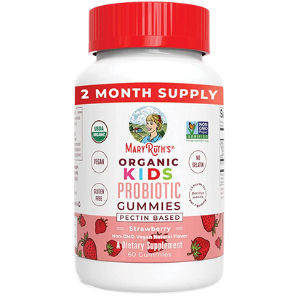
Mary Ruth’s Organic Kids Probiotic Gummies
- Vegan.
- Supports gut and immunity.
- USDA-certified.
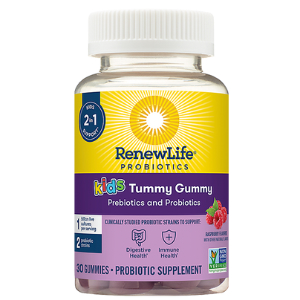
Renew Life Kids Tummy Gummy
- 2 billion active cultures.
- Soy and dairy-free.
- Contains B. coagulans.
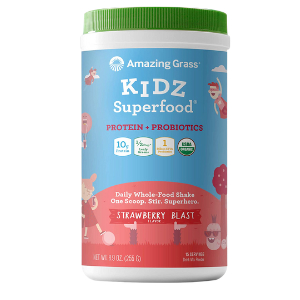
Amazing Grass Protein + Probiotics
- 2 flavors.
- Probiotic shake powder.
- Gluten-free and vegan.
The digestive tract is the first and most frequent entry point for germs[1] into our bodies. If the stomach acids do not kill the germs once they enter the gut from contaminated food, they enter the bloodstream. We all understand that this cannot be good.
The types of bacteria present in our digestive system should be balanced. An imbalance can affect an individual’s immune system and overall gut health, and this is also true in children. One key way to balance gut bacteria is by consuming probiotics, beneficial bacteria that help to restore balance in the gut.
Adults can eat mindfully and thus are more likely to get in enough healthy foods that support gut health, like probiotics. But the good news is that parents can support their child’s gut health by giving their children the best probiotics for kids.
Probiotics aid digestion and disease prevention and may support a healthy weight. Children with digestive disorders, including constipation, irritable bowel syndrome[2], or inflammation[3], may benefit from probiotic supplements.
Best Probiotics For Kids In (April. 2024)
- Mary Ruth’s Organic Kids Probiotic Gummies – Editor’s Choice
- Renew Life Kids Tummy Gummy – Best Probiotic For kids 3-Years and Older
- Amazing Grass Protein + Probiotics – Best Tasting Probiotics For Kids
- OLLY Kids Multi + Probiotic – Best Probiotic and Multivitamin Combo
- NatureWise Chewable Probiotics for Kids and Infants – Best Probiotics For 2-Year-Olds and Younger
What Are Probiotics For Kids?
Probiotic supplements for kids are probiotic supplements that have been designed for children and toddlers. They consist of kid-friendly probiotics that offer a healthy probiotic supply for kids to replenish their intestinal flora. They are a supplement to fill nutritional gaps when kids are not consuming enough probiotic foods.
Probiotics are naturally occurring healthy bacteria and yeasts. They include beneficial microorganisms that keep your gut and immune system healthy.
Probiotics support a healthy microbiome in the body. A microbiome is a colony of organisms that sustain health called microorganisms, or microbes. Your body contains trillions of microbes that include:
- Bacteria.
- Fungi -Yeast.
- Protozoa.
- Viruses.
A microbe must possess several key qualities to be classified as a probiotic. These include the following:
- Be separated from humans.
- Remains in your intestine following consumption.
- Provide a tangible health advantage.
- Safe for ingestion.
Most probiotics for kids are in the form of probiotic gummies or tasty powders that youngsters find appealing and delicious.
Types of Probiotics
There are hundreds of different types of probiotic species, and all serve a purpose.
Bifidobacterium, Bacillus, Escherichia, Enterococcus, Lactobacillus, Saccharomyces, and Streptococcus are the seven main genera[4] of microorganisms most frequently employed in probiotic supplements.
- Bifidobacterium bifidum[5]: This strain aids your body in vital processes like digestion and warding off unwanted bacteria that can pose harm.
- Bacillus[6]: This probiotic helps us break down the food we eat and is primarily present in the skin and gastrointestinal (GI) tract.
- Escherichia coli[7]: It aids in the digestion of the food we consume, the creation of vitamin K, and helps us to better utilize the nutrients we’re taking in.
- Enterococcus[8]: This probiotic typically resides in the female vaginal tract and intestines. Usually, it doesn’t make us ill. However, it can occasionally cause a blood infection called sepsis in those who are immunocompromised.
- Lactobacillus[9]: These probiotics protect from potential pathogen infestations and also serve as a source of nutrition. This probiotic also produces lactic acid, which lowers the pH of the vagina. They can be found in the digestive system and the female reproductive system. It has the potential to keep harmful bacteria from entering our bodies..
- Saccharomyces cerevisiae[10]: Found in the digestive system, it aids in food fermentation.
- Streptococcus[11]: These probiotics make powerful substances called superantigens from viruses and bacteria that stimulate the immune system.
In the next section, we highlight the five best probiotics for kids.
5 Best Children’s Probiotics To Boost Digestive System 2024
Mary Ruth’s Organic Kids Probiotic Gummies
This probiotic supplement for kids contains Bacillus subtilis which may help with gut health, digestion, and immunity.
- It supports immune health and digestive health.
- It may help with gut health by balancing gut flora.
- The brand has a USDA organic seal.
- It is non-GMO, gluten-free, soy-free, and lactose-free.
- It is vegan-friendly.
- There is only one option for flavor.
These gummies may support a diverse, balanced microbiota, promoting healthy bowel regularity in the child.
Mary Ruth’s Organic Kids Probiotic Gummies advertise themselves as the best on the market and, as such, one of the best probiotics for kids on our list. And there’s a good reason behind it.
It is made using the probiotic strain Bacillus subtilis, which is excellent for young children in preschool. Ninety-one healthy kids[12] between the ages of 2 and 6 were given this probiotic strain or a placebo for eight weeks in one study.
The findings suggested that the gut microbiome’s diversity increased after taking this probiotic strain. This may help lower inflammation and enhance the immune response.
This study makes it reasonable to conclude that this product is among the best probiotics for toddlers and preschoolers.
Additionally, this supplement is nut-free, lactose-free, gluten-free, and soy-free.
Mary Ruth’s kid’s probiotics are USDA-certified, non-GMO, and vegan-friendly in terms of purity and certification. The production of this probiotic supplement takes place in a certified Good Manufacturing Practices (cGMP) approved facility for good manufacturing practices.
A (GMP) certification program offers unbiased confirmation and certification that the basic requirements and fundamental production procedures required for the implementation of a successful Hazard Analysis Critical Control Point (HACCP) food safety program are being obeyed.
Orders above $75 qualify for free shipping, and their “happy refund” guarantee allows for a full refund without needing to return the item.
Renew Life Kids Tummy Gummy
The Renew Life Kids Tummy Gummy supplement claims to offer kid-friendly, delicious gummies that support a healthy gut bacteria count in your toddler. It is both lactose-free and soy-free.
- Contains 2 billion live probiotic cultures.
- It is devoid of any dairy or soy.
- It may help balance gut bacteria and promote a healthy gut.
- It is an affordable probiotic for toddlers above three years.
- It contains tree nuts and wheat.
Try Renew Life® Kids Probiotics Gummies can provide a tasty dose of digestive support for your child. This dietary supplement contains real fruit flavors and 2 billion live probiotic bacteria that your child can easily enjoy on the go.
This probiotic supplement promotes a healthy digestive system and general wellness in children ages three and older. It contains a Bacillus coagulans[17] strain that has undergone scientific study, and its effectiveness, quality, and purity are ensured until expiration. Most clients on Amazon using this product report that it works well for them.
The company offers auto-delivery services at monthly, two, three, and six-month intervals. For busy working parents, this is a definite plus. They are able to store enough for their children without having to worry about it running out.
For a 30-day supply, one container contains 60 gummies. The dose is usually two gummies a day. You can also buy in bulk to save a little extra money. The company offers all of its customers a 60-day money-back guarantee.
Amazing Grass Protein + Probiotics
Just like the name, Amazing; the brand purports to offer the same to the kids using it. Your kids can choose from creamy chocolate or fruity strawberry flavor.
- It is gluten-free.
- It contains a plethora of fruits and vegetables.
- It is USDA organic certified.
- It offers 1 billion CFU probiotics.
- They have an inclusive subscription program.
- Some clients attest that the taste is not as expected, especially the strawberry flavor.
Unlike any other probiotic for kids; this one contains a blend of real fruits and veggies. This combo offers probiotics and a supply of 10 grams of protein in each serving that supports your child’s nutritional health.
A rainbow powdered blend of natural greens, fruits, and veggies was combined to produce Kidz SuperFood Protein + Probiotics, a guilt-free nutritious powerhouse that tastes great. A single glass provides incredible green nourishment and aids in consuming a healthy blend of fruits and veggies. You can mix, blend, or bake until your child’s favorite food or drink.
Natural flavors, organic acacia gum, organic stevia, organic beet juice powder, Bacillus coagulans (probiotic), organic pineapple[18], organic banana, organic carrot[19], organic raspberry, organic sweet potato[20], organic acai, organic broccoli, organic spinach, and organic blueberry[21]are all ingredients in this product.
It also contains an organic pea protein[22] and greens blend (alfalfa[23], barley grass, and wheat grass)[24], organic coconut sugar, and natural flavors. Mix one scoop with 12 ounces or more of milk, water, or smoothie.
OLLY Kids Multi + Probiotic
Their unique blend incorporates vitamins plus probiotics that may optimize your child’s gut, support mental health, and provide an added supply of antioxidants.
- It contains a healthy blend of both vitamins and probiotics.
- It supports gut health thanks to probiotics.
- It boosts immunity.
- It is NSF certified, meaning it is devoid of all banned substances.
- Many customers complained that they received the supplement melted and merged into one messy gel.
This multivitamin in a bite-sized form is filled with important nutrients kids need in a tasty gummy they’ll eat, including a boost of beneficial bacteria to support growing bodies.
Your kids will appreciate the Yum Berry Punch flavor. Additionally, the mixture has a full complement of vitamins, including zinc, vitamins A, B, C, D, and E.
B vitamins can support both mental[25] and physical energy[26]. Zinc and vitamin D[27] promote skeletal and immunological[28] systems. Vitamins A, C, and E[29] provide the child’s body with antioxidants supporting overall health and aiding in the battle against free radicals. Free radicals are unstable molecules in the environment that can pose harm to our health.
Last but not least, probiotics are present to support a healthy digestive system.
Children ages 2 to 4 should chew one gummy daily, and children over four should chew two per day for better gut health. This blend is the most reasonably priced of all the ones we have discussed in this article. OLLY is a recognized B Corp[30] member of the Council For Responsible Nutrition[31].
NatureWise Chewable Probiotics for Kids and Infants
By delivering 4 billion CFU of “friendly” bacteria to your child’s GI tract, NatureWise Probiotics for Infants & Kids promotes the development of your child’s microbiome, according to the manufacturer.
- It contains 4 billion active cultures.
- Supports gut health and immune health.
- It is available in two flavors: strawberry and vanilla.
- This daily probiotic is devoid of any allergens.
- It is hard to dose a serving.
- Some kids do not like the taste.
- It is expensive.
Lactobacillus rhamnosus[13], Bifidobacterium infantis[14], Lactobacillus plantarum[15], and Bifidobacterium lactis[16] are the four distinct probiotic bacterial strains found in this kids and infant blend, which can support a balanced microbiome in your child. They also employ natural vanilla and strawberry flavors that are sugar-free and yummy, making them simple to consume as a daily probiotic. The manufacturer claims that its chewable tablets support a healthy stomach, promote easy digestion, and improve general health.
They assert that their formula contains scientifically studied probiotic strains found to survive stomach acid and multiply rapidly in the GI tract, promote beneficial gut flora, and support immunity and digestive health in children and babies.
They create this supplement in a cGMP (current Good Manufacturing Practices) certified facility, audited for quality standards by independent bodies like NPA, NSF, and UL. The brand manufactures this probiotic supplement in the USA.
Infants should take half a pill crushed and combined with water, while toddlers should chew on one tablet daily.
The company provides a full refund for the returned supplement under a 60-day money-back guarantee.
What Are Benefits of Probiotics For Kids?
Here are the main benefits probiotics offer[32] toddlers and infants:
- Boosts immunity.
- Improves digestion.
- Optimizes gut health
- It may help ease some gastrointestinal issues like diarrhea and constipation.
- It may help with weight management.
How To Select The Best Children’s Probiotic?
Ensuring that the probiotic product is the best for your child is very important. However, before you jump into using the best baby probiotics or the best probiotics for toddlers, visit your child’s pediatrician. In the same way, you would seek medical advice when selecting probiotics for women, it should also especially be done for kids.
The doctor will usually assess your child and advise you on your options to support their little tummies. The first option is typically adjusting the child’s diet. But if that is ineffective or the digestive systems worsen, supplements may be the next recommendation.
Once you get to this point, there are several factors to consider in order to get the best child’s probiotics. Always discuss with your child’s pediatrician before making a decision to determine the best probiotic for their unique needs. That way, your child will get all the benefits of the probiotic you give them. You also be comfortable when giving your kid the ideal probiotics.
Here is what to look for:
- Additional ingredients like gluten added sugars, and flavoring, especially if your child is sensitive to gluten..
- The certification the supplement holds.
- Third-party testing.
- The price against the value.
- The brand’s reputation: look for any FDA warning letters, active lawsuits, and customer reviews.
- The shipping and return policy of the brand.
Final Word: Are Probiotics Safe For Children?
If you utilize the best children’s probiotic supplement as directed by your doctor, probiotics are generally safe for kids. Additionally, ensure the brand you’re using contains the right bacteria that will benefit your child based on their pediatrician’s recommendations.
Before choosing a probiotic supplement for your infant, consult a pediatrician first. Each probiotic is unique, just like your child. The requirements of one youngster may not be the same as another.
Your child needs the best probiotics for infants, ss, or preschoolers. A doctor’s appointment is essential because of this. In addition, make sure your child is active and eating a good diet to improve their general health. The supplement is additional; the main supply of probiotics should come from a healthy and organic diet.
Frequently Asked Questions
Yes, probiotics are beneficial for children and adults alike. Probiotics are good for digestion, immunity, and gut health. Ideally, offer kids probiotic foods like kimchi, pickles, and yogurt. If that is not enough, try a probiotic supplement for kids.
Probiotics are generally safe when taken as directed and pose minimal side effects. Some may experience gas or bloating in the beginning as their body adjusts to it. Always speak to your child’s pediatrician for personalized recommendations.
Depending on the strain, certain probiotics may need to be stored below a certain temperature in order to survive. This is because some strains die off above when exposed to high temperatures. As a best practice, always check the product label for proper storage guidelines.
Yes, certain probiotic strains have been seen to improve diarrhea. Many probiotic strains can help, but Lactobacillus reuteri, Lactobacillus rhamnosus, and the yeast Saccharomyces boulardii are most likely to have a diarrhea-reducing effect.
Beyond stomach upset, probiotics can help boost immunity and improve healthy gut flora.
+ 32 sources
Health Canal avoids using tertiary references. We have strict sourcing guidelines and rely on peer-reviewed studies, academic researches from medical associations and institutions. To ensure the accuracy of articles in Health Canal, you can read more about the editorial process here
- Biology LibreTexts. (2020). 12.1.2: How Pathogens Cause Disease. [online] Available at: https://bio.libretexts.org/Courses/Mansfield_University_of_Pennsylvania/BSC_3271%3A_Microbiology_for_Health_Sciences_Sp21_(Kagle)/12%3A_How_Microbes_Cause_Disease/12.01%3A_Microbial_Mechanisms_of_Pathogenicity/12.1.02%3A_How_Pathogens_Cause_Disease#:~:text=Mucosal%20surfaces%20are%20the%20most,tract%2C%20and%20the%20genitourinary%20tract.
- Martens, U., Enck, P. and Egmont Zieseniß (2010). Probiotic treatment of irritable bowel syndrome in children. [online] ResearchGate. Available at: https://www.researchgate.net/publication/42109870_Probiotic_treatment_of_irritable_bowel_syndrome_in_children
- Yoon, W., Park, S.H., Lee, J.S., Byeon, J.H., Kim, S.H., Lim, J. and Yoo, Y. (2021). Probiotic mixture reduces gut inflammation and microbial dysbiosis in children with atopic dermatitis. Australasian Journal of Dermatology, [online] 62(3). doi:10.1111/ajd.13644.
- ods.od.nih.gov. (n.d.). Office of Dietary Supplements – Probiotics. [online] Available at: https://ods.od.nih.gov/factsheets/Probiotics-HealthProfessional/#:~:text=The%20seven%20core%20genera%20of.
- O’Callaghan, A. and van Sinderen, D. (2016). Bifidobacteria and Their Role as Members of the Human Gut Microbiota. Frontiers in Microbiology, [online] 7. doi:10.3389/fmicb.2016.00925.
- Lee, N.-K., Kim, W.-S. and Paik, H.-D. (2019). Bacillus strains as human probiotics: characterization, safety, microbiome, and probiotic carrier. Food Science and Biotechnology, [online] 28(5), pp.1297–1305. doi:10.1007/s10068-019-00691-9.
- Martinson, J.N.V. and Walk, S.T. (2020). Escherichia coli Residency in the Gut of Healthy Human Adults. EcoSal Plus, [online] 9(1). doi:10.1128/ecosalplus.esp-0003-2020.
- García-Solache, M. and Rice, L.B. (2019). The Enterococcus: a Model of Adaptability to Its Environment. Clinical Microbiology Reviews, [online] 32(2). doi:10.1128/cmr.00058-18.
- Di Cerbo, A., Palmieri, B., Aponte, M., Morales-Medina, J.C. and Iannitti, T. (2015). Mechanisms and therapeutic effectiveness of lactobacilli. Journal of Clinical Pathology, [online] 69(3), pp.187–203. doi:10.1136/jclinpath-2015-202976.
- Liu, W., Li, L., Ye, H., Chen, H., Shen, W., Zhong, Y., Tian, T. and He, H. (2017). From Saccharomyces cerevisiae to human: The important gene co-expression modules. Biomedical Reports, [online] 7(2), pp.153–158. doi:10.3892/br.2017.941.
- Nakata, M. and Kreikemeyer, B. (2021). Genetics, Structure, and Function of Group A Streptococcal Pili. Frontiers in Microbiology, [online] 12. doi:10.3389/fmicb.2021.616508.
- Paytuví-Gallart, A., Sanseverino, W. and Winger, A.M. (2020). Daily intake of probiotic strain Bacillus subtilis DE111 supports a healthy microbiome in children attending day-care. Beneficial Microbes, [online] 11(7), pp.611–620. doi:10.3920/bm2020.0022.
- Korpela, K., Salonen, A., Virta, L.J., Kumpu, M., Kekkonen, R.A. and de Vos, W.M. (2016). Lactobacillus rhamnosus GG Intake Modifies Preschool Children’s Intestinal Microbiota, Alleviates Penicillin-Associated Changes, and Reduces Antibiotic Use. PLOS ONE, [online] 11(4), p.e0154012. doi:10.1371/journal.pone.0154012.
- Chichlowski, M., Shah, N., Wampler, J.L., Wu, S.S. and Vanderhoof, J.A. (2020). Bifidobacterium longum Subspecies infantis (B. infantis) in Pediatric Nutrition: Current State of Knowledge. Nutrients, [online] 12(6), p.1581. doi:10.3390/nu12061581.
- Liu, Liong, Chung, Huang, Peng, Cheng, Lin, Wu and Tsai (2019). Effects of Lactobacillus plantarum PS128 on Children with Autism Spectrum Disorder in Taiwan: A Randomized, Double-Blind, Placebo-Controlled Trial. Nutrients, [online] 11(4), p.820. doi:10.3390/nu11040820.
- Abou El-Soud, N.H., Said, R.N., Mosalam, D.S., Barakat, N.A.M. and Sabry, M.A. (2015). Bifidobacterium lactis in Treatment of Children with Acute Diarrhea. A Randomized Double Blind Controlled Trial. Open Access Macedonian Journal of Medical Sciences, [online] 3(3), pp.403–407. doi:10.3889/oamjms.2015.088.
- Dutta, P., Mitra, U., Dutta, S., Rajendran, K., Saha, T.K. and Chatterjee, M.K. (2011). Randomised controlled clinical trial of Lactobacillus sporogenes (Bacillus coagulans), used as probiotic in clinical practice, on acute watery diarrhoea in children. Tropical Medicine & International Health, [online] 16(5), pp.555–561. doi:10.1111/j.1365-3156.2011.02745.x.
- Zygmunt Zdrojewicz, Chorbińska, J., Bartosz Bieżyński and Krajewski, P. (2018). Health-promoting properties of pineapple. [online] ResearchGate. Available at: https://www.researchgate.net/publication/326777843_Health-promoting_properties_of_pineapple
- João Silva Dias (2014). Nutritional and Health Benefits of Carrots and Their Seed Extracts. [online] ResearchGate. Available at: https://www.researchgate.net/publication/276499931_Nutritional_and_Health_Benefits_of_Carrots_and_Their_Seed_Extracts
- Liu, M., Li, X., Zhou, S. and Wang, J. (2020). Dietary fiber isolated from sweet potato residues promote healthy gut microbiome profile. [online] ResearchGate. Available at: https://www.researchgate.net/publication/338049150_Dietary_fiber_isolated_from_sweet_potato_residues_promote_healthy_gut_microbiome_profile
- Kalt, W., Cassidy, A., Howard, L.R., Krikorian, R., Stull, A.J., Tremblay, F. and Zamora-Ros, R. (2019). Recent Research on the Health Benefits of Blueberries and Their Anthocyanins. Advances in Nutrition. [online] doi:10.1093/advances/nmz065.
- Dominika Swiatecka, Świątecka Dominika, Arjan Narbad and Kostyra Henryk (2011). The study on the impact of glycated pea proteins on human intestinal bacteria. [online] ResearchGate. Available at: https://www.researchgate.net/publication/49793985_The_study_on_the_impact_of_glycated_pea_proteins_on_human_intestinal_bacteria
- Wang, J., Qin, C., He, T., Qiu, K., Sun, W., Zhang, X., Jiao, N., Zhu, W. and Yin, J. (2018). Alfalfa-containing diets alter luminal microbiota structure and short chain fatty acid sensing in the caecal mucosa of pigs. Journal of Animal Science and Biotechnology, [online] 9(1). doi:10.1186/s40104-017-0216-y.
- Chauhan, M. and Chauhan, M. (2014). A pilot study on wheat grass juice for its phytochemical, nutritional and therapeutic potential on chronic… [online] ResearchGate. Available at: https://www.researchgate.net/publication/332810463_A_pilot_study_on_wheat_grass_juice_for_its_phytochemical_nutritional_and_therapeutic_potential_on_chronic_diseases
- Lopresti, A.L. (2015). A review of nutrient treatments for paediatric depression. Journal of Affective Disorders, [online] 181, pp.24–32. doi:10.1016/j.jad.2015.04.014.
- Tardy, A.-L., Pouteau, E., Marquez, D., Yilmaz, C. and Scholey, A. (2020). Vitamins and Minerals for Energy, Fatigue and Cognition: A Narrative Review of the Biochemical and Clinical Evidence. Nutrients, [online] 12(1), p.228. doi:10.3390/nu12010228.
- Shams, B., Afshari, E., Tajadini, M., Keikha, M., Qorbani, M., Heshmat, R., Motlagh, M.E. and Kelishadi, R. (2016). The relationship of serum vitamin D and Zinc in a nationally representative sample of Iranian children and adolescents: The CASPIAN-III study. Medical journal of the Islamic Republic of Iran, [online] 30, p.430. Available at: https://www.ncbi.nlm.nih.gov/pmc/articles/PMC5307609/
- Name, J.J., Souza, A.C.R., Vasconcelos, A.R., Prado, P.S. and Pereira, C.P.M. (2020). Zinc, Vitamin D and Vitamin C: Perspectives for COVID-19 With a Focus on Physical Tissue Barrier Integrity. Frontiers in Nutrition, [online] 7. doi:10.3389/fnut.2020.606398.
- Traber, M.G. and Stevens, J.F. (2011). Vitamins C and E: Beneficial effects from a mechanistic perspective. Free Radical Biology and Medicine, [online] 51(5), pp.1000–1013. doi:10.1016/j.freeradbiomed.2011.05.017.
- Bcorporation.net. (2017). OLLY PBC – Certified B Corporation – B Lab Global. [online] Available at: https://www.bcorporation.net/en-us/find-a-b-corp/company/olly
- Crnusa.org. (2022). Home | Council for Responsible Nutrition. [online] Available at: https://www.crnusa.org/
- Depoorter, L. and Vandenplas, Y. (2021). Probiotics in Pediatrics. A Review and Practical Guide. Nutrients, [online] 13(7), p.2176. doi:10.3390/nu13072176.

